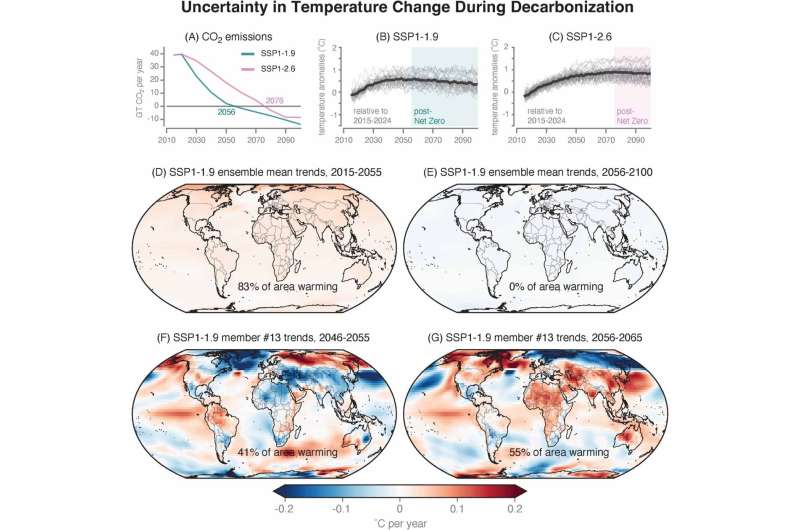This article has been reviewed according to Science X's editorial process and policies. Editors have highlighted the following attributes while ensuring the content's credibility:
fact-checked
trusted source
proofread
Cooling the planet: Work doesn't stop at net zero, scientists say

Earth's global temperatures would need at least a decade to stabilize after the entire globe cuts carbon emissions to zero, according to new research that involves Colorado State University's atmospheric scientists.
Our climate system is complex, so the finding is expected and should not deter climate policies, said Pat Keys, CSU assistant professor and one of three authors on a new paper published in Environmental Research: Climate.
If anything, the results of the study provide a key piece of information for how to understand our future, Keys said. "If things end up getting a little hotter or it's the hottest thing we've seen in decades, that's not a failure of the policy. It's just the way the climate system works."
Other contributors to the paper include lead author Noah Diffenbaugh, a Stanford professor and frequent CSU collaborator, and Elizabeth Barnes, also a professor in the CSU Department of Atmospheric Science.
Scientists at CSU are leaders in studying impacts of climate change and improving research on potential climate intervention strategies.
As part of that research, Barnes, Keys, and Diffenbaugh decided to ask "what if?"
What if every climate policy in the world succeeded and we all suddenly achieved net zero emissions?
The world would be the hottest it's been in human history, and could still get hotter for a decade or more, even if the policies do exactly as intended.
"This is not unexpected. The world is going to continue warming until we turn our emissions down to zero," Keys said. "We need to systematically understand, even with the most optimistic policy scenario, the potential that we might still experience these substantially high temperatures."
Researchers looked at how the Earth's climate may unfold using a large set of climate model simulations, which represented net zero decarbonization. They showed that even in climate model simulations where net zero is achieved, natural variations in the climate system can still drive temperature increases for the ten years following.
"This means that even if we get our act together and achieve net-zero, and even IF that net-zero policy is perfectly designed, natural climate variability could still drive climate extremes in the decade following," Barnes said.
Studies like these can improve our ability to understand and communicate how internal climate variability can lead to a wide variety of outcomes.
More information: Noah S Diffenbaugh et al, Probability of continued local-scale warming and extreme events during and after decarbonization, Environmental Research: Climate (2023). DOI: 10.1088/2752-5295/accf2f
Provided by Colorado State University



















